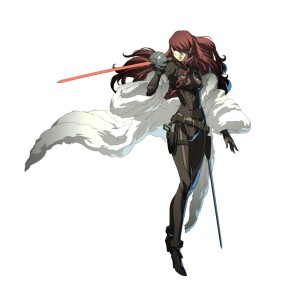Persona 4 Arena, Jung and Social MMOs: Achieving Harmony Between Persona and Shadow
by RadiumEyes, HSM team writer
Most of us don’t see ourselves as perfect; in fact, “perfection” exists as a nebulous ideal that may not have an exact definition.
What makes someone “perfect” when it comes to self-image, personality, cultural standing and other criteria that many of us look towards to gauge not only ourselves, but others around us? Persona 4 Arena, the first fighting game in the Persona series (itself an offshoot of the Megami Tensei franchise), raises the critical issue of how we view ourselves through the use of a mysterious televised fighting tournament hosted by an apparently changed Teddie; fans of the Persona series may already know this, but the franchise delves into Jungian philosophy, particularly the archetypal pedagogy described by Clifford Mayes.
To give an overview: Jung expounded upon an individual quest for wholeness through the interactions of various abstracts, including the ego, shadow, personal and collective unconscious, and persona; important for Persona is the duality of the persona and shadow. The latter represents something in the unconscious that the ego does not identify as part of itself; as such, the shadow tends to become the “negative” side of us that we, as humans, have difficulty accepting. By contrast, we concomitantly develop a public image, the persona, described by Jung as a “kind of mask” utilized to disguise one’s true (or, at least, complete) identity – the characters in Persona 4 Arena are teenagers, and in high school, one of the great liminal stages of human development where one prepares for adulthood, so one can imagine the difficulties present in a high school setting.
Persona 4 Arena expands upon the narrative of Persona 4 by having the protagonists and antagonists confront their own personal shadows directly – characters such as Chie Satonaka and Kanji Tatsumi have fights against their “shadow selves” during the tournament, a dramatic visual interpretation of the internal interaction between one’s conscious thoughts and actions (i.e., the persona) and the unconscious fears and aspects of ourselves that we may not want to directly address (i.e., the shadow). Since all this takes place in the television world, an unusual space accessed through a television screen, the characters simultaneously address their own personal doubts about their negative aspects emerging; General Teddie preys upon their apprehensions by warping their mind to make them think others speak very critically about themselves, effectively controlling the collective unconscious indirectly through affecting one’s personal unconscious. The only way the participants can break through General Teddie’s machinations is to recognize his manipulation of their psyches and cooperate to bring down whoever’s responsible for pitting them against each other – and that means accepting their shadows for who they are, instead of ignoring or denying their existence.
 Acceptance of one’s own faults, and improving oneself as one faces challenges and stress, tackles one of the main concepts in Jung’s writings – psychological projection. One of the most famous ideas in all of psychology, projection refers to the personal discomfort with unpleasant impulses found in one’s own behavior, and “projecting” those bad things onto others. As Mr. Edogawa explained in Persona 4 Golden’s bonus content, everyone has an unconscious section of the mind, and here exist the persona and shadow – in addition, the collective unconscious acts as a “network” where various personas and shadows interact through social interaction. All this takes place without our awareness; Persona 4 Arena causes us, by playing as any of numerous characters in the franchise, to think about our own personal fears by seeing the likes of Chie, Mitsuru and others confront their respective shadows. The game literalizes the shadow-persona duality, but it speaks to the core of Jungian psychology – within everyone is the complex interaction between the conscious and unconscious minds, where balance can be maintained or broken.
Acceptance of one’s own faults, and improving oneself as one faces challenges and stress, tackles one of the main concepts in Jung’s writings – psychological projection. One of the most famous ideas in all of psychology, projection refers to the personal discomfort with unpleasant impulses found in one’s own behavior, and “projecting” those bad things onto others. As Mr. Edogawa explained in Persona 4 Golden’s bonus content, everyone has an unconscious section of the mind, and here exist the persona and shadow – in addition, the collective unconscious acts as a “network” where various personas and shadows interact through social interaction. All this takes place without our awareness; Persona 4 Arena causes us, by playing as any of numerous characters in the franchise, to think about our own personal fears by seeing the likes of Chie, Mitsuru and others confront their respective shadows. The game literalizes the shadow-persona duality, but it speaks to the core of Jungian psychology – within everyone is the complex interaction between the conscious and unconscious minds, where balance can be maintained or broken.
This can be applied to real life; think of how we interact with others on Home, or other social networks, on the terms of the conscious-unconscious relationship.
Home offers a great example of where Persona 4 Arena’s psychological leanings can be understood – whenever one logs into Home and speaks with friends or strangers, one uses a “persona” (a digital avatar being the most readily apparent example) to engage with others, while our “shadows” typically remain unobtrusive, outside of the public eye. However, one may notice times when someone inadvertently reveals his shadow, whether through psychological projection or discussions of one’s apprehensions about a variety of topics; the troll, like General Teddie, can make the shadow manifest itself by exploiting emotions and social graces through bad behavior and manipulation. This can occur throughout the Internet – digital societies have their fair shares of troll stories, and Home is included among this. Thanks to the perceived anonymity granted by digital networks (a digital “collective unconscious,” if ever there was one), people will act up without much provocation; General Teddie epitomizes the irrational, fearsome side of human behavior, as he can make people fight each other for his own personal amusement. What makes him terrifying is his ability to alter one’s perceptions – he is very much youkai-like in this respect, as his mischief has the capacity for great social and emotional harm.
 However, General Teddie has one weakness – namely, his assumption that everyone around him will believe his lies and machinations, instead of recognizing his actions for the tricks they are. Persona 4 Arena does a wonderful job in illustrating how the protagonists manage their own personal dreads; Chie Satonaka, for example, reasserts her desire to become a police officer, while simultaneously recognizing her own disquiet about being weak. She feels inferior to Yukiko, but she wants to protect everyone, nonetheless; her friends accept her for herself, and their words of encouragement help her realize she can rely on her own strength and determination to protect her friends.
However, General Teddie has one weakness – namely, his assumption that everyone around him will believe his lies and machinations, instead of recognizing his actions for the tricks they are. Persona 4 Arena does a wonderful job in illustrating how the protagonists manage their own personal dreads; Chie Satonaka, for example, reasserts her desire to become a police officer, while simultaneously recognizing her own disquiet about being weak. She feels inferior to Yukiko, but she wants to protect everyone, nonetheless; her friends accept her for herself, and their words of encouragement help her realize she can rely on her own strength and determination to protect her friends.
That’s something we all can learn from; a weakness doesn’t have to dominate us, and when we recognize it and accept our own limitations, we can pave our own roads to self-improvement and self-respect. Home, and other social MMOs, may be scary and frustrating sometimes, but we are human, after all; we have our own personas and shadows, and understanding how each interact goes a long way into one’s personal development.
Share
| Tweet |



 Twitter
Twitter